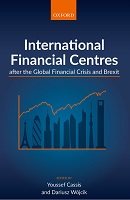| dc.contributor.editor | Cassis, Youssef | |
| dc.contributor.editor | Wójcik, Dariusz | |
| dc.date.accessioned | 2023-06-29T13:31:31Z | |
| dc.date.available | 2023-06-29T13:31:31Z | |
| dc.date.issued | 2018 | |
| dc.identifier.uri | https://library.oapen.org/handle/20.500.12657/63706 | |
| dc.description.abstract | This book gathers leading economic historians, geographers, and social scientists to focus on the developments in key international financial centres following the 2008 Global Financial Crisis and to consider the likely effects of Brexit on these centres. Eleven centres in eight countries are taken into consideration: New York, London, Frankfurt, Paris, Zurich/Geneva, Hong Kong/Shanghai/Beijing, Tokyo, and Singapore. The book addresses three main issues. The first is the hierarchy of international financial centres, in particular whether Asian financial centres have taken advantage of the crisis in the West. The second is the medium-term effects of the crisis, with respect to the volume of business activity (including employment), and the level of regulation, with concerns regarding the risks of regulatory overkill. And the third is the rise of new technology, known as fintech, possibly the most important change in the decade following the crisis, with questions as to whether it will render financial centres, as we know them, unnecessary for the functioning of the global economy, and which cities are likely to emerge as hubs of new financial technology. Finally, the book discusses the likely effects of Brexit on international financial centres, in particular London, Paris, and Frankfurt. The book takes a decidedly interdisciplinary approach, with a general introduction providing a global overview from a historical perspective, and a general conclusion providing a global overview from a geographical perspective. Its focus on the implications for global financial centres is unique among books about the aftermath of the Global Financial Crisis. | en_US |
| dc.language | English | en_US |
| dc.subject.classification | thema EDItEUR::K Economics, Finance, Business and Management::KC Economics | en_US |
| dc.subject.classification | thema EDItEUR::K Economics, Finance, Business and Management::KF Finance and accounting | en_US |
| dc.subject.classification | thema EDItEUR::K Economics, Finance, Business and Management::KC Economics::KCL International economics | en_US |
| dc.subject.classification | thema EDItEUR::K Economics, Finance, Business and Management::KC Economics::KCX Economic and financial crises and disasters | en_US |
| dc.subject.classification | thema EDItEUR::K Economics, Finance, Business and Management::KF Finance and accounting::KFF Finance and the finance industry::KFFK Banking | en_US |
| dc.subject.classification | thema EDItEUR::R Earth Sciences, Geography, Environment, Planning::RG Geography::RGC Human geography::RGCM Economic geography | en_US |
| dc.subject.classification | thema EDItEUR::K Economics, Finance, Business and Management::KC Economics::KCZ Economic history | en_US |
| dc.subject.other | international financial centre, global financial crisis, Brexit, financial regulation, fintech, banking, financial and business services, Asia, Europe, United States of America | en_US |
| dc.title | International Financial Centres after the Global Financial Crisis and Brexit | en_US |
| dc.type | book | |
| oapen.identifier.doi | 10.1093/oso/9780198817314.001.0001 | en_US |
| oapen.relation.isPublishedBy | b9501915-cdee-4f2a-8030-9c0b187854b2 | en_US |
| oapen.relation.isFundedBy | fd53808a-cdec-480e-bf85-f52973f603b7 | en_US |
| oapen.pages | 267 | en_US |
| oapen.place.publication | Oxford | en_US |
| oapen.remark.public | Funder name: School of Geography and the Environment, University of Oxford | |

